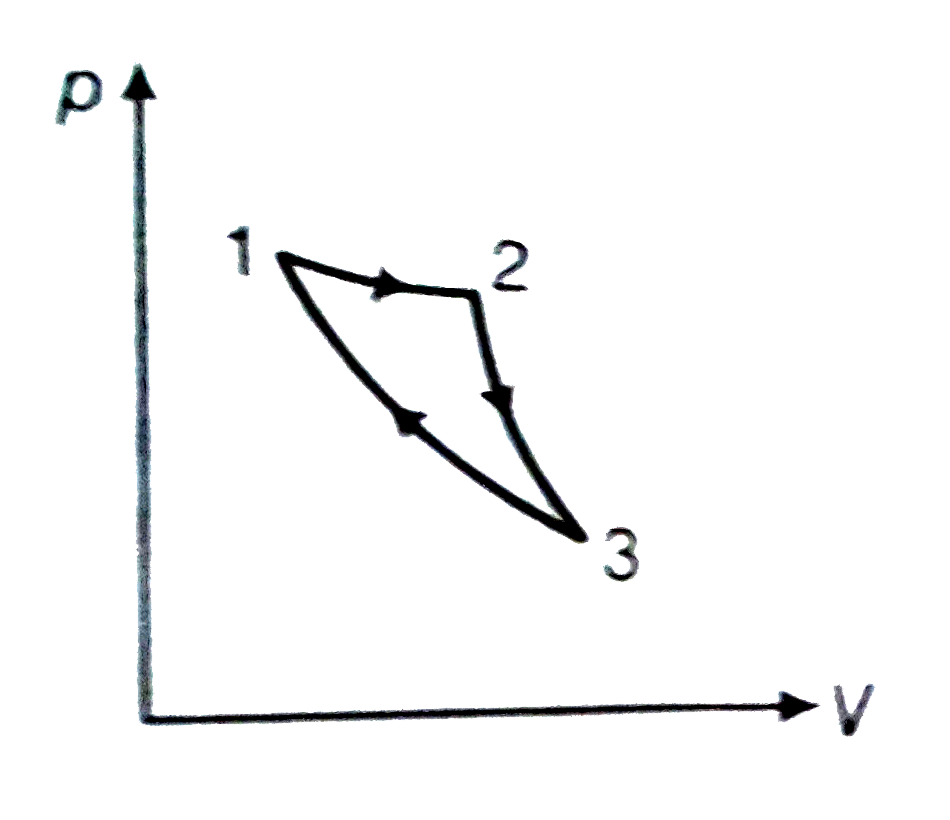Consider a cycle followed by an engine
1 to 2 is isothermal
2 to 3 is adiabatic
3 to 1 is adiabatic
such a process does not exist because
a) heat is completely converted to mechanical energy in such a process, which is not possible
b) mechanical energy is completely converted to heat in this process, which is not possible
c) curves representing two adiabatic processes don't intersect
d) curves representing an adiabatic process and an isothermal process don't intersect
 Solution in Telugu
Solution in Telugu
Only a, b are correct
only b, d are correct
only c, d are correct
only a , c are correct
The correct Answer is:D
Step by step video, text & image solution for Consider a cycle followed by an engine 1 to 2 is isothermal 2 to 3 is adiabatic 3 to 1 is adiabatic such a process does not exist because a) heat is completely converted to mechanical energy in such a process, which is not possible b) mechanical energy is completely converted to heat in this process, which is not possible c) curves representing two adiabatic processes don't intersect d) curves representing an adiabatic process and an isothermal process don't intersect by Physics experts to help you in doubts & scoring excellent marks in Class 11 exams.
Updated on:21/07/2023Topper's Solved these Questions
- THERMODYNAMICSBOOK - AAKASH SERIESCHAPTER - THERMODYNAMICSEXERCISE - EXERCISE - 1B
32 Videos
- THERMODYNAMICSBOOK - AAKASH SERIESCHAPTER - THERMODYNAMICSEXERCISE - EXERCISE - 2
58 Videos
- THERMODYNAMICSBOOK - AAKASH SERIESCHAPTER - THERMODYNAMICSEXERCISE - Problem
60 Videos
- THERMAL PROPERTIES OF MATTERBOOK - AAKASH SERIESCHAPTER - THERMAL PROPERTIES OF MATTEREXERCISE - ADDITIONAL PRACTICE EXERCISE (LEVEL - II) PRACTICE SHEET (ADVANCED) Integer/Subjective Type Questions
2 Videos
- THERMOMETRY BOOK - AAKASH SERIESCHAPTER - THERMOMETRY EXERCISE - Numerical Exercise (LEVEL- 1)
11 Videos
Similar Questions
Assertion (A) & Reason (R ) Type Questions
(A): During a free expansion of an ideal gas workdone is zero
(R): Workdone against vacuum is zero
View SolutionHow much steam at 100∘C is to be passed into water of mass 100g at 20∘c to raise its temperature by 5∘C ? (Latent heat of steam is 540 cal /g and specific heat of water is 1cal/g∘C)
View SolutionHailstones fall from a certain height. If they melt completely on reaching the ground, find the height from which they fall.
View SolutionA constant pressure gas thermometer has a volume of 200cc, 273.2cc and 525 .1cc at 0°C, 100°C and boiling point of sulphur respectively. The resistance possessed by a platinum wire at the same temperatures as above are 2.000Ω,2.778Ωand5.280Ω respectively. Estimate the boiling point of sulphur on the basis of the two sets of observations.
View SolutionIf a temperature scale defines the freezing point of water as 100∘C and the boiling as 0∘ what temperature on the scale corresponds to 25∘ C ?
View SolutionA reversible heat engine carries 1 mole of an ideal monatomic gas aroung the cycle 1-2-3-1. Process 1-2 takes place at constant volume, process 2-3 take place at constant volume, process 2-3 is adiabatic, and process 3-1 takes place at constant pressure. Complete the values for the heat Delta Q , the change in internal energy Delta U , and the work done Delta , for each of the three processes and for the cycle as a whole.
View SolutionDoes the internal energy of an ideal gas change in an isothermal process? In an adiabatic process?
View SolutionConsider a cycle followed by an engine, (figure) 1 to 2 is isothermal 2 to 3 is adiabatic 3 to 1 is adiabatic such a process does not exist because
View SolutionConsider a cycle followed by an engine (figure.)

1 or 2 is isothermal
2 to 3 is adiabatic
3 to 1 is adiabatic
Such a process does not exist, because
View SolutionCan the given heat energy be completely converted to work in a cyclic process? If not , when can the heat can completely converted to work ?
View SolutionCan we convert heat completely into mechanical work in a cyclic process.
View SolutionStatement-1: There is a natural asymmetry between work to heat and converting heat to work .
Statement-2: No process is possible in which the sole result is the absorption of heat from a reservoir and its complaete conversion into work .
View SolutionCan the given heat energy be completely converted to work in a cyclic process? If not , when can the heat can completely converted to work ?
View SolutionConsider a cycle followed by an engine as shown in figure,
1 to 2 is isothermal
2 to 3 is adiabatic
3 to 1 is adiabatic
Such a process does not exist because

View SolutionConsider a cycle followed by an engine (figure.)

1 or 2 is isothermal
2 to 3 is adiabatic
3 to 1 is adiabatic
Such a process does not exist, because
View SolutionCan a given amount of mechanical energy be completely converted into heat ?
View Solution
